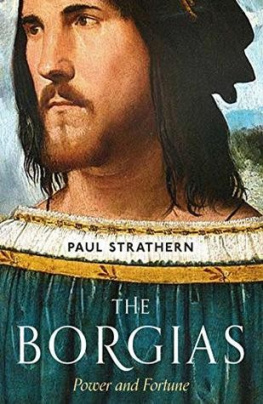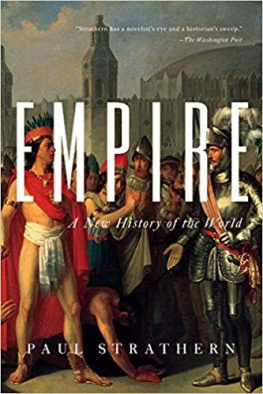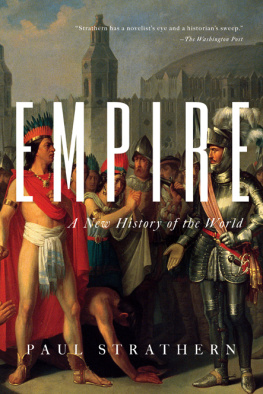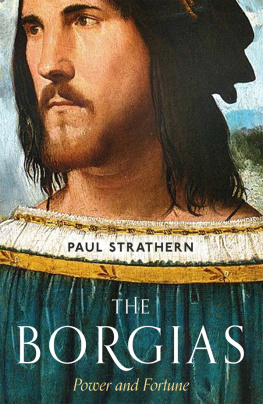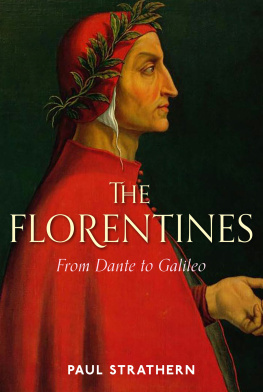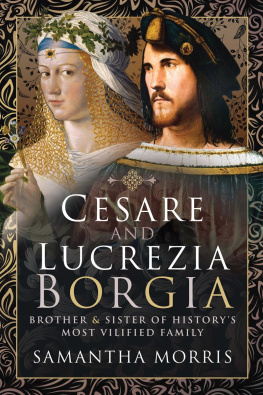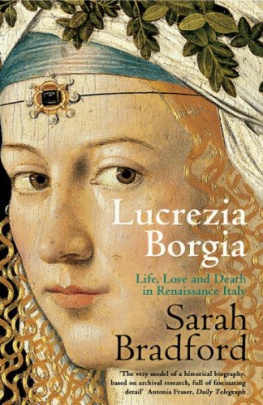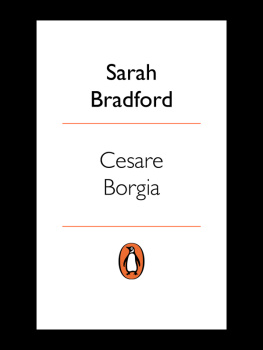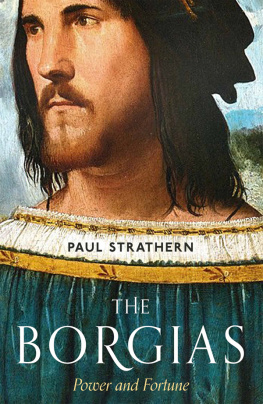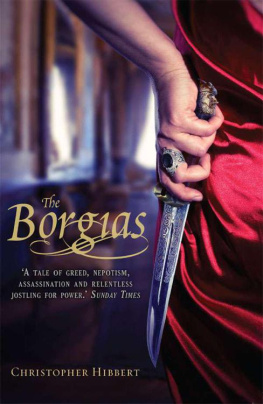THE
BORGIAS
ALSO BY PAUL STRATHERN
Mendeleyevs Dream
Dr Strangeloves Game
The Medici
Napoleon in Egypt
The Artist, the Philosopher and the Warrior
Death in Florence
The Spirit of Venice
The Venetians
First published in Great Britain in 2019 by Atlantic Books,
an imprint of Atlantic Books Ltd.
Copyright Paul Strathern, 2019
The moral right of Paul Strathern to be identified as the author
of this work has been asserted by him in accordance with the
Copyright, Designs and Patents Act of 1988.
All rights reserved. No part of this publication may be reproduced,
stored in a retrieval system, or transmitted in any form or by any means,
electronic, mechanical, photocopying, recording, or otherwise, without
the prior permission of both the copyright owner and
the above publisher of this book.
Map artwork by Jeff Edwards 1 2 3 4 5 6 7 8 9
A CIP catalogue record for this book is available
from the British Library.
Hardback ISBN: 978-1-78649-544-0
Trade paperback ISBN: 978-1-78649-964-6
Paperback ISBN: 978-1-78649-546-4
E-book ISBN: 978-1-78649-545-7
Printed in Great Britain Atlantic Books
An Imprint of Atlantic Books Ltd Ormond House
2627 Boswell Street London
WC1N 3JZ
www.atlantic-books.co.uk
To
Julian Alexander
agent extraordinaire
CONTENTS


ABBREVIATED BORGIA FAMILY TREE

DRAMATIS PERSONAE
This list is not exhaustive. If any names you are looking for do not appear, try looking up the page of their first entry in the Index .
Alexander VI Born Rodrigo Borgia, he rose during the papacy of his uncle, who became Pope Callixtus III. Alfonso II Son of King Ferrante I of Naples, whom he succeeded as short-lived King of Naples. King Alfonso of Aragon Made controversial heir to the throne of Naples by Joanna II. The future Callixtus III became his secretary. Georges dAmboise Archbishop of Rouen and a powerful influence at the French royal court. Alfonso of Aragon, Duke of Bisceglie Illegitimate son of King Alfonso II of Naples, whose father was Ferrante I. Alfonso became Lucrezias beloved second husband. Sancia of Aragon Spirited childhood friend of Lucrezia Borgia, who fell in and out of favour with Alexander VI. Cardinal Basilios Bessarion Greek scholar who was at one time a candidate for the papacy. Pietro Bembo Venetian poet who wrote sonnets to Lucrezia Borgia when she was living in Ferrara and married to the Duke of Ferrara. Alonso de Borja See Callixtus III. Cesare Borgia Oldest son of Vanozza de Cattanei and Cardinal Rodrigo Borgia, the future Alexander VI. Giovanni Borgia Known as the Infans Romanus ; the child who appeared in the Borgia family, whose parentage became a source of scandalous speculation. Isabella Borgia Sister of Callixtus III, mother of Rodrigo, who became Alexander VI. Juan Borgia Younger brother of Cesare Borgia, who much resented him. Jofr Borgia Fourth child of Rodrigo Borgia by Vanozza de Cattanei. Lucrezia Borgia Daughter of Alexander VI, who married her off several times in pursuance of his political goals. Pedro Luis Borgia Nephew of the man who would become Callixtus III, appointed by his uncle as Captain-General of the Papal Forces. Cardinal Rodrigo Borgia See Alexander VI. Pedro Calderon Nicknamed Perotto, who was Alexander VIs unfortunate chamberlain. Callixtus III , born Alfonso de Borja, the first Borgia Pope, who gave his nephew Rodrigo Borgia the all-important post of Vice-Chancellor. Cardinal Angelo Capranica Loyal friend to Callixtus III. Vanozza de Cattanei Mistress of Cardinal Rodrigo Borgia (Alexander VI) and mother of Cesare, Juan, Lucrezia and Jofr. Charles VIII The young King of France who invaded Italy. Miguel da Corella Known as the strangler, one of Cesare Borgias closest Spanish commanders. Alfonso dEste Son of Ercole I dEste, was ruler of Ferrara, became third husband of Lucrezia Borgia. Ercole I dEste Military leader, Duke of Ferrara, who grudgingly allowed his son to marry Lucrezia Borgia. Isabella dEste Cultured Marquesa of Mantua, who disliked Lucrezia Borgia. Had her portrait sketched by Leonardo. Fiammetta de Michaelis The renowned Roman courtesan whom Cesare took as his mistress during the summer of 1500. Giulia Farnese Sixteen-year-old who became mistress to the fifty-eight-yearold Alexander VI. Ferrante I The long-lived King of Naples, whose death triggered the invasion of Italy by Charles VIII of France. Francesco Gonzaga Duke of Mantua and husband to Isabella dEste. Francesco Guicciardini A contemporary historian and friend of Machiavelli. Innocent VIII The Pope who preceded Alexander VI. Joanna of Aragon At twenty-three became the second wife of the ageing King Ferrante I, and thus became Queen of Naples. Not to be mistaken for the earlier Queen Joanna II of Naples (see below) who had died before she was born. Queen Joanna II of Naples Aged ruler of Naples who made Alfonso of Aragon her heir, thus antagonizing French claimants to the throne. Ramiro da Lorqua Cesare Borgias most trusted Spanish commander. Louis XII Formerly Louis of Orlans, who succeeded to the French throne after Charles VIII. Cardinal Giovanni de Medici Son of Lorenzo de Medici, who would became a cardinal aged thirteen, but fled Rome when Alexander VI became pope. Lorenzo de Medici Also known as the Magnificent, the ruler of Florence. Niccol Machiavelli Notorious author of The Prince , contemporary historian and emissary for Florence to Cesare Borgia. Federigo da Montefeltro Renowned condottiere who transformed Urbino into a Renaissance city. Guidobaldo da Montefeltro Son of Federigo, who became a sworn enemy of Cesare Borgia. Oliverotto da Fermo Originally a loyal commander of Cesare Borgias army in the Romagna. Cardinal Giambattista Orsini Senior member of the Orsini clan who became a friend of Alexander VI. Giulio Orsini Condottiere who together with his brother Paolo joined up with Cesare Borgia in the Romagna campaigns. Paolo Orsini See previous entry. Riario family Genoese relatives of the della Rovere family. Francesco della Rovere The young ruler of Sinigalia Cardinal Giuliano della Rovere Sworn enemy of Alexander VI, continually plotting against him. Sancia See Sancia of Aragon. Antonio di Monte Sansovino Humanist scholar appointed by Cesare Borgia as governor of his Romagna territories. Gian Carlo Scalona Mantuan ambassador in Rome. Cardinal Ascanio Sforza Influential cleric from Milan whose vote ensured Rodrigo Borgia would become Alexander VI. Giovanni Sforza Lord of Pesaro and Lucrezia Borgias first husband. Caterina Sforza Countess of Forli, who was taken prisoner by Cesare Borgia and Sixtus IV. Gaspar Torella Cesare Borgias Spanish personal physician, who became an expert on syphilis. Cardinal Giovanni Zeno Extremely wealthy Venetian cleric who lived in Rome. On his death Alexander VI took charge of his fortune.
PROLOGUE
THE CROWNING MOMENT
I N THE SUMMER OF 1492, amidst the stifling, malaria-infested heat of Rome, Pope Innocent VIII became unwell, and it was soon clear that he was seriously ill. He began suffering from stomach pains, and his digestion was severely affected. The Popes personal physicians proved for the most part unwilling to take any responsible role in administering to a patient who was so evidently close to death. This was understandable in an age where medicine remained primitive and suspicions of poisoning were rife, with punishments for such misdemeanours proving drastic in the extreme. Indeed, doing nothing was often less likely to harm the patient than administering the usual accepted treatments. However, amongst the Popes personal physicians was a Jewish doctor called Giacomo di San Genesio, who favoured his own advanced methods of medical treatment above the more medieval practices then current. Excessive bleeding with leeches was commonplace, and usually only served to weaken the patient. Similarly archaic was the administering of elixirs of life containing gold or ground pearl or other exotic ingredients, whose sheer expense encouraged the expectation of efficacy. Instead, San Genesio was all for radical and experimental treatments, several of which would later be adopted by orthodox contemporary medicine. Unfortunately, many of these treatments had yet to evolve the modern refinements which accounted for their curative, rather than their hazardous properties. In order to cure Innocent VIII, Giacomo di San Genesio decided to perform the worlds first blood transfusion. This involved him bleeding the Pope, whilst at the same time inducing him to drink draughts of freshly drawn youthful blood, a treatment which would result in the death of three ten-year-old boys, before San Genesio was persuaded to desist. By then Innocent VIII had become so weak that he was able to take for nourishment no more than a few drops of milk from the breast of a young woman.
Next page
